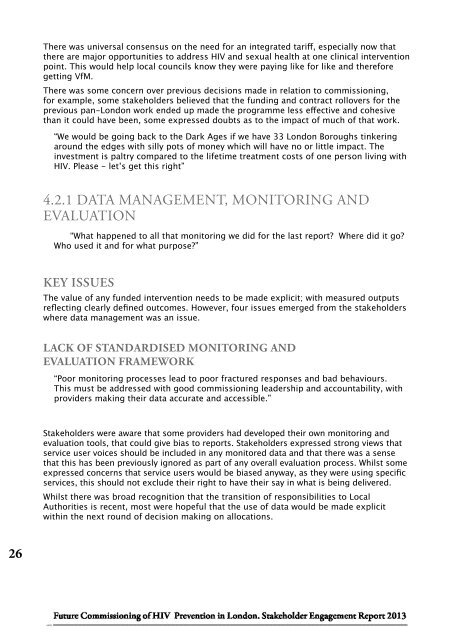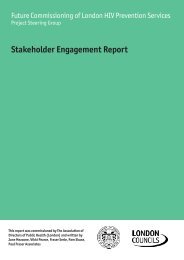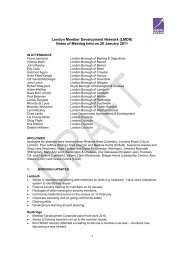Stakeholder Engagement Report - London Councils
Stakeholder Engagement Report - London Councils
Stakeholder Engagement Report - London Councils
You also want an ePaper? Increase the reach of your titles
YUMPU automatically turns print PDFs into web optimized ePapers that Google loves.
There was universal consensus on the need for an integrated tariff, especially now that<br />
there are major opportunities to address HIV and sexual health at one clinical intervention<br />
point. This would help local councils know they were paying like for like and therefore<br />
getting VfM.<br />
There was some concern over previous decisions made in relation to commissioning,<br />
for example, some stakeholders believed that the funding and contract rollovers for the<br />
previous pan-<strong>London</strong> work ended up made the programme less effective and cohesive<br />
than it could have been, some expressed doubts as to the impact of much of that work.<br />
“We would be going back to the Dark Ages if we have 33 <strong>London</strong> Boroughs tinkering<br />
around the edges with silly pots of money which will have no or little impact. The<br />
investment is paltry compared to the lifetime treatment costs of one person living with<br />
HIV. Please - let’s get this right”<br />
4.2.1 Data management, monitoring and<br />
evaluation<br />
“What happened to all that monitoring we did for the last report? Where did it go?<br />
Who used it and for what purpose?”<br />
Key Issues<br />
The value of any funded intervention needs to be made explicit; with measured outputs<br />
reflecting clearly defined outcomes. However, four issues emerged from the stakeholders<br />
where data management was an issue.<br />
Lack of standardised monitoring and<br />
evaluation framework<br />
“Poor monitoring processes lead to poor fractured responses and bad behaviours.<br />
This must be addressed with good commissioning leadership and accountability, with<br />
providers making their data accurate and accessible.”<br />
<strong>Stakeholder</strong>s were aware that some providers had developed their own monitoring and<br />
evaluation tools, that could give bias to reports. <strong>Stakeholder</strong>s expressed strong views that<br />
service user voices should be included in any monitored data and that there was a sense<br />
that this has been previously ignored as part of any overall evaluation process. Whilst some<br />
expressed concerns that service users would be biased anyway, as they were using specific<br />
services, this should not exclude their right to have their say in what is being delivered.<br />
Whilst there was broad recognition that the transition of responsibilities to Local<br />
Authorities is recent, most were hopeful that the use of data would be made explicit<br />
within the next round of decision making on allocations.<br />
26




